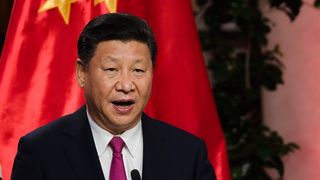It has been a challenging 12 months for the People’s Republic of China and its paramount leader, President Xi Jinping.
Domestically, many are blaming the Communist Party for the spread of the coronavirus, given the official priority attached to controlling information and suppressing dissent rather than trying to prevent transmission of COVID-19 during the earlier stages of the emergency.
Externally, the country is on the nose over its illegal activities in the South China Sea and the detention of an estimated one million Uighurs in Xinjiang. Protracted protests in Hong Kong and the recent landslide victory by Taiwan’s President Tsai Ing-wen — who expressed strong support for the protesters and for defending Taiwan’s way of life — are evidence that Chinese populations accustomed to civil liberties are rejecting what Beijing has to offer.
A Pew Research Centre poll released in December last year indicates most respondents from countries such as Australia, Japan, India, Indonesia and The Philippines view China’s growing economic and military power as bad. Most have lost confidence that Xi will “do the right thing”. Whatever public diplomacy gains were banked by China in the first decade of this century have largely been lost.
A Pew Research Centre poll released in December last year indicates most respondents from countries such as Australia, Japan, India, Indonesia and The Philippines view China’s growing economic and military power as bad.
It is only Australia, Japan and the US that are cobbling together serious plans to counter the worst excesses of Chinese bullying and balancing against its overreach.
Although many Southeast Asian states have found their maritime territory and ability to exercise their economic rights in the waters of the South China Sea are being aggressively contested by China, we have not seen a concerted push-back by any of them. None is prepared to do the heavy lifting to resist, let alone shape, Chinese activities.
Southeast Asia has emerged as the primary political and strategic battleground for presence, influence and relevance in the Indo-Pacific. Where these states stand on the acceptability of Chinese policies and the rules and norms that govern the Indo-Pacific matters immensely for Australia.
Given that it is increasingly difficult to make the case that China is emerging as a benign power in the region, one would expect these vulnerable states to welcome the balancing role played by Canberra, Tokyo and Washington. After all, more disconcerting than an unpredictable America is the prospect of a dominant Asian power that cannot be booted out in the same way US forces were forced to leave Subic Bay in The Philippines in 1991, then the largest US naval base in our part of the world.
The power of Chinese narratives
China’s disproportionate military might and economic importance to Southeast Asian countries can partially account for the tendency of these smaller states to avoid confronting China or, worse, to implicitly acquiesce to Chinese policies that undermine their own interests and sovereignty such as is occurring in the South China Sea.
Material factors offer only a partial explanation for why persuading these states to oppose even egregious Chinese actions is so difficult. US pre-eminence may be fading but China is not the stronger military power. Japan is the larger investor in Southeast Asia while advanced economies in North America and Europe are more important sources of innovation and know-how to these growing economies than is China.
If China possesses a magic weapon to help it gain support for — or to silence opposition to — its strategic and security policies, it is the considerable success Beijing has had in controlling and manipulating grand narratives. Under Xi, the narrative presented to the Southeast Asian audience has changed significantly. Previously, China was desperate to emphasise its sense of vulnerability and scale of domestic challenges to counter fears about its accumulation of comprehensive national power. Since about 2014, however, China has moved towards promoting strength, rather than downplaying it, and concealing vulnerability.
If China possesses a magic weapon to help it gain support for — or to silence opposition to — its strategic and security policies, it is the considerable success Beijing has had in controlling and manipulating grand narratives.
For example, Beijing prefers to overstate the expansiveness of flagship economic industrial policies such as the Belt and Road Initiative and Made in China 2025. Projects involving Chinese firms in the 65 or more countries along the BRI often are counted as BRI projects even if that project was not conceived with the BRI in mind or preceded the formal announcement of the BRI. The idea is to promote the BRI as an unstoppable behemoth emanating from the greatness and determination of wise rulers in Beijing.
More broadly, Xi makes the case for the inevitability of Chinese success and dominance to an external audience. This is unlike his predecessors since Deng Xiaoping, who stressed the scale and depth of Chinese vulnerabilities and challenges. One can see this in the way Beijing promotes its authoritarian capitalist model as a superior political and economic one compared with that of the US.
In the authors’ recent discussions with more than 100 officials and experts across Southeast Asia, it was passed on that the message of inevitable Chinese success and dominance is persistently emphasised when these individuals interact with Chinese officials.
An important corollary of this narrative is another that undercuts perceptions of US and allied strategic priorities, commitment to the region, and reliability as an economic and strategic partner. Beijing promotes the view that the US is a regional interloper whose interest in Asia is “optional”. As the script goes, Washington will always be distracted by other global events such as those occurring in the Middle East. Different administrations will be at odds with each other and will be led by the vagaries and irrationalities of domestic politics.
The remarkably consistent message to these smaller regional states is that Washington is not dependable and always at risk of abandoning individual states. In contrast, China is permanently in the region, focused first and foremost on Asia, unchanging in its objectives to reclaim its rightful historical place as the Middle Kingdom, fundamentally undeterrable and prepared to pay any cost to achieve its objectives.
In any event, these narratives are the essential underpinning for Chinese strategic success. For smaller states, the will to resist even a revisionist and aggressive great power is significantly diminished if there is consensus that the great power will dominate regardless of whether other states disapprove of China’s behaviour.
Striking an unequal accommodation or removing oneself from the fray is preferable to balancing against the future dominant power, which may seek retribution. For small states, one must not fight the future but learn to adapt and make the best of it.
This offers some background to the common observation among Southeast Asian diplomats that their Chinese counterparts seem to care less about causing worry and offence than was the case in previous decades.
Authority and legitimacy with Chinese characteristics
This is not to say that Beijing’s approach lacks subtlety or nuance. Consider some primary forms of diplomatic messaging China uses for Southeast Asia compared with messaging reserved for Western liberal democracies such as Australia, the US and the EU states. With respect to messages to the latter, China promotes the motion of “mutual benefit” and “win-win”, ideas outwardly respectful of sovereign equality.
In contrast, with respect to Southeast Asians, there is increasing emphasis by Beijing on the permanence and greatness of Chinese civilisation as the enduring basis for hierarchical but stable and benevolent relationships with smaller states in Asia. Importantly, according to the Chinese message, the benevolence and fairness of Chinese civilisational rule over centuries is a guarantee that the contemporary Chinese overlord will be just and fair. This, rather than support for the abstract notion of a rules-based order favoured by Australia and others, is designed to enhance Chinese authority and leadership.
With respect to messages to the latter, China promotes the motion of “mutual benefit” and “win-win”, ideas outwardly respectful of sovereign equality.
China has attached these narratives — of the return of a great and benevolent hierarchy — to policies directed towards Southeast Asian states. To Southeast Asians, Beijing is not apologetic that the BRI is China-centric or even that Chinese entities are the primary beneficiaries. China will flatter these countries in telling them they form essential nodes for a vast China-centric network. The underlying message is that benefits can flow to the entire region only if the great Chinese civilisational state is at the centre of economic, political and diplomatic life in the region. As Xi puts it: “When the big river is full of water, the smaller ones never run dry.”
In selling the material virtues of a hierarchical Chinese-centric order the main drawcard is the guarantee of benefits to smaller states, in comparison to the uncertain benefits of the Australian preferred “rules-based order”. Whereas impersonal and ruthless market-based principles create short-term winners and losers based on the merit-based measurement of profitability and economic efficiency, embracing the Chinese system will give participants guaranteed benefits even if these are unevenly distributed. This might include Beijing’s largesse in the form of development assistance and grants or an immediate increase in Chinese tourist numbers. But the point of depicting opportunity as largesse is that only by submitting to a Sino-centric world can one secure such largesse for oneself.
Entering the contest of ideas
Australian commentators offering strong criticism of the Turnbull and Morrison governments’ forward-leaning tendencies to counter the damaging aspects of Chinese policies tend to endorse the mentioned Chinese narratives. To them, the future is set and resistance is futile, costly and vainglorious. Better to develop a “special relationship” with China now and secure the best relationship possible even if that means obeisance and ignoring differences.
It is for this reason that the contest of ideas matters and coming up with persuasive counter-narratives is an important complement to the conventional suite of foreign policy settings.
There are four counter-narratives that immediately come to mind and for which there is ample evidence if called upon.
First, it is widely believed that the more assertive policies of Xi and the Communist Party begin from a position of unprecedented strength and national resilience, with few domestic vulnerabilities. This is associated with the perception there is a unique economic and governance competence that must be attributed to the authoritarian Chinese political economic framework in contrast to the chaos and dysfunction of liberal democracies.
In fact, the truth is quite the opposite. Xi and the Communist Party are engaged in a high-risk and high-cost approach to pursuing growing Chinese ambitions abroad while concealing festering internal weaknesses and vulnerabilities. One could point to growing concerns for the rapid accumulation of debt in the domestic financial system and through the shadow banking network that is relied on to fund many economically questionable projects as part of the BRI. Another is the deteriorating capacity of local governments to fund public and social goods as a disproportionately large share of public spending is devoted to internal and external security.
China cannot achieve its external objectives without the co-operation of the US and other major advanced economies. Despite its economic size, its economic tools and levers in the world are surprisingly limited in important respects.
Second, a common perception is that China does not need the US and other advanced economies to achieve its objectives. As the argument goes, it is already a sufficiently large and sophisticated nation that is close to achieving a terrifying self-sufficiency.
In fact, China cannot achieve its external objectives without the co-operation of the US and other major advanced economies. Despite its economic size, its economic tools and levers in the world are surprisingly limited in important respects. The resilience of its domestic economy is enormously vulnerable to external policies. The yuan is neither free floating nor freely convertible. This continues to place severe limits on the extent to which it can become a “store of value” and therefore a genuine reserve international currency. Even BRI partners demand payment in foreign currency when partnering with Chinese firms.
China also still relies heavily on importing hi-tech components, machinery, know-how and intellectual property. Using its National Bureau of Statistics definition of hi-tech, China has a current account deficit with advanced economies. The other hi-tech sectors include biotechnology and life sciences, optoelectronics, electronics, computer-integrated machinery and aerospace materials and applications.
Third, it is commonly believed the US and other countries have little ability to influence domestic Chinese politics, especially when it comes to challenging Xi’s authority to pursue his more expansive policies. In fact, the pressure on Xi, as Chairman of Everything, is acute and his high-risk approach is causing immense internal angst.
In recent times, he has been openly accused of mismanaging the relationship with the US, criticised for decisively abandoning any market-based reforms that would make the Chinese economy more resilient and agile, and overreaching with respect to his aggressive promotion and rolling out of the BRI and other economic plans. Xi’s purging of more than 1.5 million officials, including more than 100 top generals and party members, will come back to bite.
The more failures for China and the increase in international resistance attributed to Xi’s actions, the more pressure he will come under to retreat and take a more cautious approach.
Its current aggressive assertion of sovereignty over parts of the South and East China Sea and hardening position on Taiwan suggests it is an expansionary and impatient power that ultimately will extend its control and reach through coercion and the use of force if it is able to do so.
As with virtually all major economic developments in China, the party soaks up the praise when things go well and will wear the blame when the reverse occurs.
Fourth, the Chinese narrative that the US is a distant power and cannot be relied on by its friends and partners needs to be addressed. After all, the US has entered two global wars in the previous century to prevent the emergence of a Eurasian hegemon.
Nevertheless, one counter-narrative could be that the geographical distance of the US means Washington must negotiate the terms of its forward presence with smaller Southeast Asian states while a “resident” power such as China does not. Requiring the acquiescence of smaller states to maintain its forward presence, the US is less likely to bully and coerce states, in contrast to a powerful China. From that perspective the US is a much more trustworthy partner for small states.
Fifth, Australia and others must continue to contest the argument that a Sino-centric economic and strategic order will be benevolent and bring guaranteed material benefits for all participants. The talk of Chinese “debt traps” is a genuine but relatively small problem. Caution must be placed in the broader context that reciprocal benefits are less likely to flow to countries within an order where China sets and enforces the rules and where the choice of alternative partners is limited.
Finally, it is important to openly contest Chinese official history about its own narrative of benevolence. Like all great nations and empires, there was expansion or contraction through countless wars and the conquering of foreign territories. The “Middle Kingdom” was not a uniquely benevolent or unchanging entity. Its current aggressive assertion of sovereignty over parts of the South and East China Sea and hardening position on Taiwan suggests it is an expansionary and impatient power that ultimately will extend its control and reach through coercion and the use of force if it is able to do so.
Psychological warfare is largely about eliminating a target’s will to resist. A critical determinant of the success of Australia’s pushback against China is to explain to our own populations and those in Southeast Asia the contradictions and fallacies with respect to Beijing’s narratives. When it comes to China, one should engage and co-operate where one can and compete where one must, especially in the realm of ideas.





